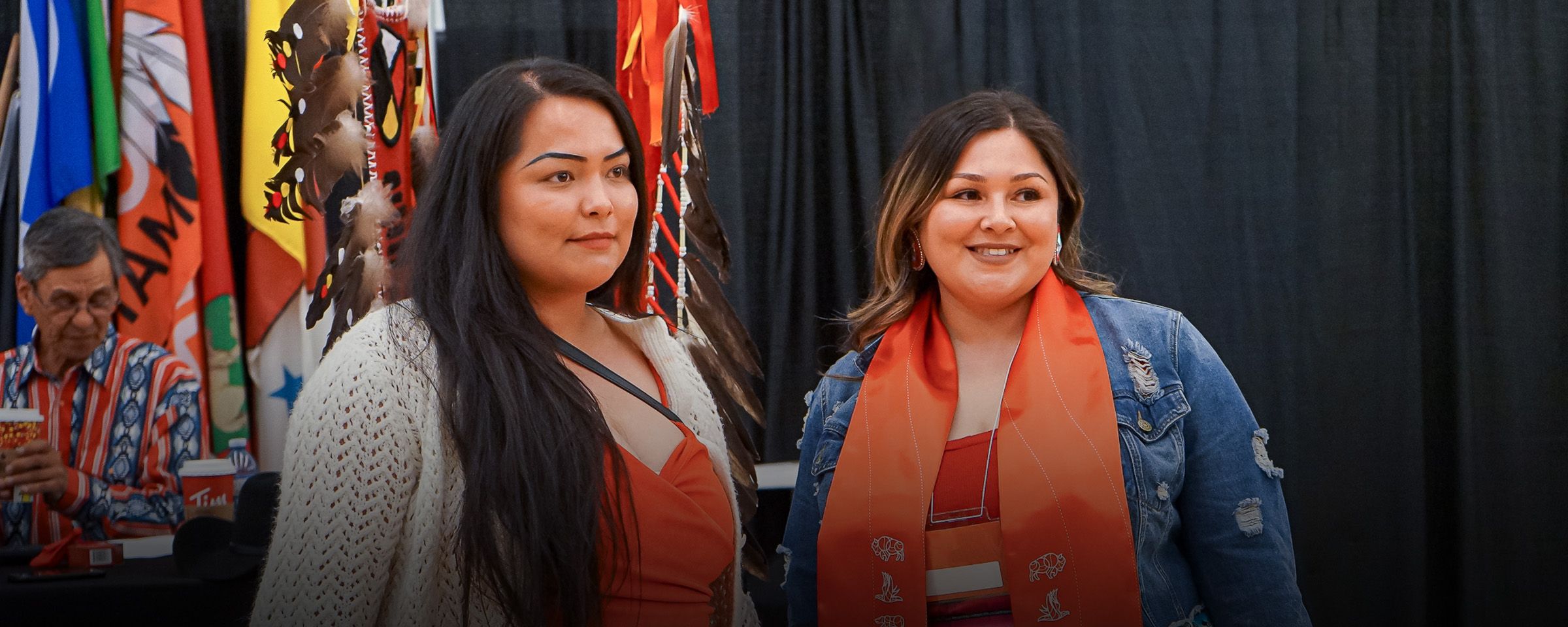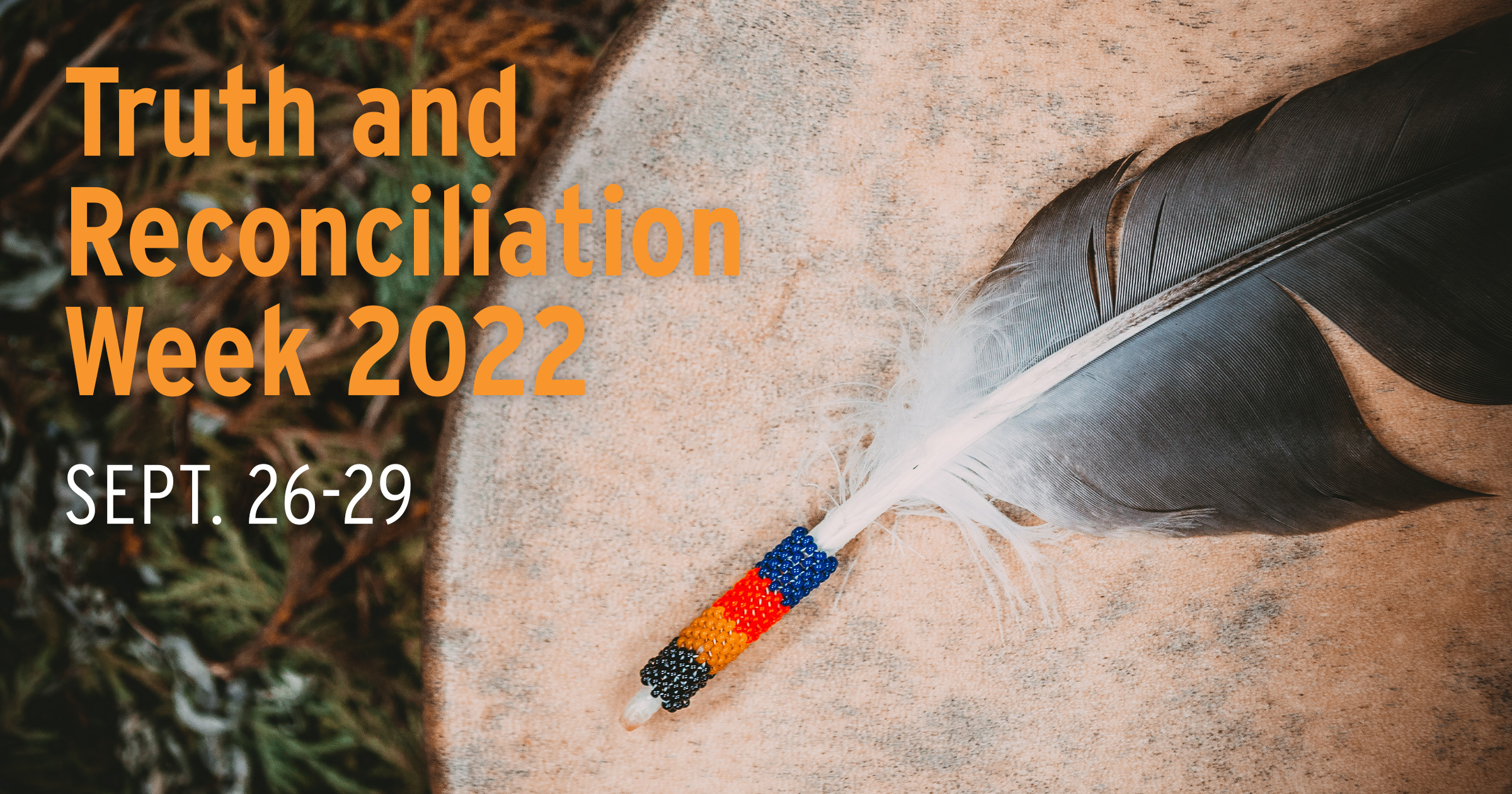Truth and Reconciliation Week 2022
Schedule of Events
All RRC Polytech students and staff are invited to participate in our fourth annual Truth and Reconciliation Week, September 26-29, 2022.
Through a mix of in-person and virtual events offered by departments from across the College, immerse yourself in Indigenous teachings, story-telling and experiences to evolve your understanding of history and current issues impacting Indigenous people, reconciliation efforts and society as a whole. Help spark a conversation around Truth and Reconciliation and contribute to understanding, healing and stronger relationships.
Truth and Reconciliation Week – Daily Activities
TRC Immersion Room Experience
In-Person – Emerging Media and Production Studios, GM-33, Mall Level, Notre Dame Campus
Presentations on the hour, every hour from 9 AM – 3 PM daily from September 26th through the 29th. Limited to 14 people per presentation.
Immerse yourself in an introductory story of Truth and Reconciliation, from the relationship with “Earth Mother” to the experience of Residential Schools. This 10-minute installation is about healing and respect. Brought to you from the Emerging Media and Production Immersion Room, this 360° media-rich installation provides an opportunity to learn, discuss, and share thoughts and experiences related to Truth and Reconciliation.
Assiniboia Residential School Exhibit
In-Person – RRC Polytech Notre Dame Campus Library
Library and Academic Services is pleased to host the Assiniboia Residential School Exhibit. On loan from The City of Winnipeg this exhibit was developed as a part of their Journey of Reconciliation. On display at Red River College Polytechnic from September 26 to October 7, the Assiniboia Residential School Indigenous Exhibit is a reconciliation project that provides an opportunity for RRC Polytech staff and students to learn about Indigenous history with a goal of renewed perspectives and understandings that will strengthen relationships with Indigenous and non-Indigenous peoples.
The Assiniboia Residential School Exhibit was created in consultation with Assiniboia Residential School Survivors Committee from the National Centre for Truth and Reconciliation and the Indigenous Exhibits Working Group.
For more information please visit https://winnipeg.ca/indigenous/reconciliation/AssiniboiaResidentialSchoolExhibit.stm
About Assiniboia Residential School
There were 17 Indian Residential Schools in Manitoba which included one location in Winnipeg known as the Assiniboia Indian Residential School. Federally funded and operated by the Grey Nuns and Oblate Fathers, the Assiniboia Indian Residential School was part of the Federal government’s educational system under the Indian Act. The school operated from 1958 until June 1973 and the school still stands today and now functions as the Canadian Centre for Child Protection including Child Find Manitoba located at 615 Academy Road in River Heights.
Please take time to visit the Assiniboia Residential School Exhibit as it will be available for viewing in the Library at the Notre Dame Campus.
Monday, September 26, 2022
Self-Guided: Ray Coco Stevenson: Opening Honour Song
Singer and composer Ray “Coco” Stevenson helps us open up the week with a traditional Honour Song to start us off in a good way. You may recognize Coco as our annual Pow Wow arena director, or as a well-known singer and drummer in the community. He was first introduced to drumming and ceremonies over thirty years ago.
In-Person: Staff Development: Indigenous Research Methodologies with Dr. Shawn Wilson
9 am – 4 pm – Roundhouse Auditorium, second floor of Manitou a bi Bii daziigae
Research is an important area at RRC Polytech that helps to guide the work we do. Dr. Shawn Wilson, from Opaskwayak Cree Nation, and author of Research is Ceremony: Indigenous Research Methods will be at the College during Truth and Reconciliation Week to share his knowledge about Indigenous research methodologies. We invite you to join us on a learning journey where we will view research through a holistic and relational lens and one rooted in ceremony.
Shawn will share with us the elements of an Indigenous research paradigm, OCAP and FPIC principles, and how to weave Indigenous traditions and practices into a research process and share with us the specific principles that need to be considered and applied when entering into research with Indigenous Peoples and Nations.
Lunch and refreshments will be provided.
Virtual Live: Student Anti-Racism training: Module 1
11:00 am – 1:00 pm
When we think and talk about racism, most people reference examples of interactions between people, but racism is also maintained by institutions and society through the implementation of policies, practices, and programs. This two-hour training will provide an introduction of how privilege and racialization contribute racism and provide a starting point for challenging systemic racism in Canada.
Module 1 of the Anti-Racism training will provide participants with an introduction to how racism functions as an interconnected system. Using videos and data reflecting both historical and current evidence of systemic racism, this training will help develop the awareness and skills needed to challenge systemic racism in Canada.
This presentation is brought to you by the Academic Success Centre (ASC) Diversity team and the Centre for International Education and Global Partnerships (CIEGP).
Tuesday, September 27, 2022
Self-Guided: The Importance of Indigenous Languages
There is more to language than just words: it’s culture, context, history and even humour. Indigenous languages need to protected. RRC Polytech Indigenous Language Instructor Corey Whitford from the School of Indigenous Education invites you to a discussion on Indigenous languages where you will also learn some phrases in Anishinaabemowin (Ojibwe), one of the most common Indigenous languages in Manitoba.
In-Person – Staff Development: Indigegogy
12:00 pm – 1:00 pm, Indigenous Support Centre, F205 Notre Dame Campus
In this session, Joanna White, Indigenous Curriculum & Cultural Advisor for the Department of Community Services, will lead faculty through a experience of holistic learning through Indigegogy, while unpacking the important role Indigegogy can and should play in the future of teaching and learning at RRC Polytech.
Participants will leave this session with a better understanding of the following questions:
- What is Indigegogy?
- Why should Indigegogy be incorporated into post-secondary programming?
- How is Indigegogy an act of reconciliation?
- What could Indigegogy look like in a post-secondary program?
- How can we create more holistic learning opportunities in our classes?
- How can we better use physical spaces to promote learning?
- What does Indigegogy look like in online teaching?
- What is the difference between honouring Indigenous ways of teaching and learning and appropriation?
- What are resources for further learning?
Snacks and refreshments will be provided.
Wednesday, September 28, 2022
Self-Guided: 1200+
Raising awareness to the issue of Missing and Murdered Indigenous Women and Girls in Canada
1200+ is a documentary film Featuring Indigenous Leader Sheila North, Directed by Leonard Yakir and Co-produced by Sheila North and Leonard Yakir.
“This film is important for us and our Indigenous communities as we need to raise awareness and bring international attention to the issue of Missing and Murdered Indigenous Women and Girls in Canada. We invite those to see the film, to learn more about the issue of MMIWG in Canada and how it is impacting our communities and families across the country. I know those dark corners of Canada’s town and cities that need more light, that need more helping hands reaching in, and that’s a big reason we made this documentary. I hope people are inspired to make change.” – Sheila North, Film Co-Creator.
Self-Guided: National Film Board of Canada Selections
Finding Dawn
Acclaimed Métis filmmaker Christine Welsh brings us a compelling documentary that puts a human face on a national tragedy – the epidemic of missing or murdered Indigenous women in Canada. The film takes a journey into the heart of Indigenous women’s experience, from Vancouver’s skid row, down the Highway of Tears in northern BC, and on to Saskatoon, where the murders and disappearances of these women remain unsolved.
Self-Guided: National Film Board of Canada Selections
Second Stories – Deb-we-win Ge-ken-am-aan, Our Place in the Circle
Lorne Olson
Lorne Olson’s short documentary presents a vision he had of two-spirited people dancing, laughing, and smiling. His vision spurs him to rediscover the strength of the past to better face the challenges of today. This funny and buoyant film documents his touching journey.
Self-Guided: Fierté Canada Pride
Stories of Two-Spirit Indigenous LGBTQ+ Indian Residential and Day School Survivors
Canada’s Indian Residential Schools (IRS) caused irreparable harm to First Nations families across many generations. 2Spirit (Indigenous LGBTQ) people were among those impacted, however their stories have rarely been heard, documented, or shared in the general discourse about this era. Following the closure of the last IRS in Ft. Qu’Appelle, Saskatchewan, in 1996, there is a generation of 2Spirit former students who are available to engage in this project. The 2Spirit Council of Fierté Canada Pride lead the engagement of 2Spirit survivors and assisted and supported them to tell their stories.
The goal of this project was to recruit eight 2Spirit Indian Residential School Survivors (Story Tellers) to participate in a speaker series project in order to preserve and share their stories. Our Project Coordinator worked with Story Tellers through a series of storytelling workshops, and support them in documenting and sharing their story through the project.
In-Person – Community Kitchen Party
12:00 pm – 1:00 pm – Library Hallway, Notre Dame Campus, Mall Level
Truth and Reconciliation Week contains many emotionally sensitive and often painful topics and it’s important that we take time for joy, community and taking care of our spirits to help us along in this journey. Join us for a community celebratory gathering and enjoy some Bannock, rice pudding, and performances by Morgan Grace, fiddling, and Peyton Habinski-Anderson, jigging.
Morgan Grace
Morgan is a 15 year old youth fiddler from east Selkirk. She is Coming off a very busy summer playing many festivals and other significant events. This year she also launched her first self-titled album. Morgan’s style originates from the vast amount of amazing fiddle teachers and fiddle players she has been fortunate to be around.
Peyton Habinski-Anderson
Peyton Habinski-Anderson is a proud, 13-year-old Métis performer. At age 7, she started jigging lessons with Dean Davis and quickly fell in love with the cultural dance. Since then, she has performed at several different Métis events and was this year’s female youth ambassador for the Métis Pavilion at Folklorama. Peyton’s goals are to continue performing at different Métis events throughout the community and spread cultural awareness.
Virtual Live & In-Person: Immersive Stories
Story Teller: Corey Whitford
12:00 pm – 1:00 pm EMP Studio, Connected Classroom
The Immersive Stories Program is designed to give students, faculty, and staff a first-hand opportunity to gain knowledge and understanding about multi-layered socio-cultural identities and lived experiences. As outlined in our new Strategic Plan, this program is part of the College’s commitment to Truth and Reconciliation, and the pursuit of equity, diversity and inclusion in everything we do.
Participants will develop skills that will allow them to regularly check their personal, social, and cultural assumptions so that they can avoid making quick conclusions and judgments. This in turn will help to foster a diverse and inclusive College environment for students and faculty.
Each session in the Immersive Stories Program will involve a discussion with a member of our RRC Polytech community, during which they will share their unique lived experiences, and invite participant questions and dialogue. These conversations will provide participants an opportunity to gain insights into the lived experiences of our diverse community and will assist in becoming aware of our own biases.
About Corey Whitford

Corey Ralph Whitford has been teaching at RRC Polytech in the Indigenous Languages Program for five years, teaching through activities that shape a better understanding of Anishinaabemowin. Corey is eager to share his knowledge and provide guidance in all class activities to his students.
Corey was born in Portage la Prairie, and raised in Sandy Bay. His parents are from Long Plain and Sandy Bay, and both were fluent Anishinaabeg. Corey’s family spoke/speaks Anishinaabemowin, so he naturally picked it up along the way.
Corey is passionate about what he does, continuing to serve his community and fill the vacuum for Anishinaabemowin knowledge at the College level.
Thursday, September 29
Self-Guided: Elder Paul Guimond: Closing Honour Song
Elder Paul Guimond, RRC Polytech Elder-in-Residence helps us close the week with an honour song dedicated to MMIWG2S in advance of the National Day of Action for Missing and Murdered Indigenous Women, Girls and Two Spirit on October 4.
It is estimated more than 4,000 Indigenous women and girls in Canada have gone missing or been murdered since 1980. According to Statistics Canada, Indigenous women and girls make up four per cent of the total Canadian female population, represent 10 per cent of missing women and, on average, 16 per cent of female homicide cases, a number that fluctuates and was as high as 21 per cent in 2014.
In-Person: Assiniboia Residential School Panel Talk
11:00 am – 12:00 pm, Notre Dame Campus Library, CM18

Join Murray Peterson, Historian with the City of Winnipeg, in a talk about the Assiniboia Residential School Exhibit and the effort of the hundreds of people it took to put the panels together.
About Assiniboia Residential School
There were 17 Indian Residential Schools in Manitoba which included one location in Winnipeg known as the Assiniboia Indian Residential School. Federally funded and operated by the Grey Nuns and Oblate Fathers, the Assiniboia Indian Residential School was part of the Federal government’s educational system under the Indian Act. The school operated from 1958 until June 1973 and the school still stands today and now functions as the Canadian Centre for Child Protection including Child Find Manitoba located at 615 Academy Road in River Heights.
Please take time to visit the Assiniboia Residential School Exhibit as it will be available for viewing in the Library at the Notre Dame Campus from September 26 to October 7.
In-Person: Immersive Stories
Story Teller: Brittany Ross
12:00 pm – 1:00 pm, Multi-purpose Round Room, E155, Manitou a bi Bii daziigae, Exchange District Campus
The Immersive Stories Program is designed to give students, faculty, and staff a first-hand opportunity to gain knowledge and understanding about multi-layered socio-cultural identities and lived experiences. As outlined in our new Strategic Plan, this program is part of the College’s commitment to Truth and Reconciliation, and the pursuit of equity, diversity and inclusion in everything we do.
Participants will develop skills that will allow them to regularly check their personal, social, and cultural assumptions so that they can avoid making quick conclusions and judgments. This in turn will help to foster a diverse and inclusive College environment for students and faculty.
Each session in the Immersive Stories Program will involve a discussion with a member of our RRC Polytech community, during which they will share their unique lived experiences, and invite participant questions and dialogue. These conversations will provide participants an opportunity to gain insights into the lived experiences of our diverse community and will assist in becoming aware of our own biases.
About Brittany Ross

Brittany Ross is a Métis woman and mother of two sons. She was born and raised in Winnipeg, and has spent over 10 years supporting, advocating and mentoring Indigenous students in the adult education, and post-secondary education sectors. Through Brittany’s previous experience, she has a fundamental understanding of the importance of creating safe, respectful and positive environments.
Brittany has developed, engaged, and maintained relationships with various stakeholders including; community organizations, school divisions, health professionals, and various levels of government. In addition, she has years of training to aide her in her new position, such as Mental Health First Aid, Indigenous Suicide Prevention, PTSD in Indigenous Adults, to name a few.
As a Navigation Coach within the School of Indigenous Education at RRC Polytech, Brittany is passionate about making a significant difference in student’s lives, and connecting with students through her open-minded, empathetic, and caring nature. She loves playing a role in supporting the successes of Indigenous students here at Red River College Polytechnic.
Virtual Live & In-Person: Residential School Thriver
Story Teller: Elder Betty Ross
12:00 pm – 1:00 pm EMP Studios, Connected Classroom
Join Elder Betty Ross as she shares her story about her experience in Canada’s Residential School System.
About Elder Betty
Elder Betty Ross originates from Pimicikamak Cree Nation and has lived in Winnipeg, MB, since the early 1960s. Betty is a Residential School Survivor of two systems St Joseph’s Residential School in Cross Lake and Assiniboia Residential School in Winnipeg, MB. She is very immersed in her Indigenous heritage and speaks Cree language fluently. She’s a mother, grandmother, great grandmother of two sons and two daughters, 15 grandsons, 12 grand daughters, and 10 great grand generations and counting.
Elder Betty worked as a Cree Interpreter and Resource worker for 11 years at the Health Science Centre. She also worked for the Winnipeg Regional Health authority as a Spiritual and Cultural Care Provider for Indigenous Health/Cultural for 10 years. Betty retired in 2018 to relax and rejuvenate before traveling to Albuquerque, New Mexico to attend the gathering of Nations where she danced Traditional for Canada. Shortly after coming back from the gathering, she was recruited by the Seven Oaks School Division as an Elder-in-Residence and works there to this day. She teaches cultural initiatives in three different schools connecting with over 3000 students weekly from all walks of life.
Betty has been very busy connecting with various community organizations in Winnipeg sharing the true story of Residential Schools as depicted in her stories Sugar Falls and Did You See Us. Elder Betty continues to walk from the best of both worlds, looking after a nurturing the great Circle of Life with honour and respect to this day.
For those joining virtually, click here for the livestream during the event.
In-Person: Fan Down
2:30-4:30 pm, Indigenous Student Support Centre (F209)
Marshall Richard, Indigenous Liaison Advisor and Scaabe, invites you to be fanned down to let go and head into the weekend with a light heart and spirit. A fan down is a smudging ceremony and a beautiful way to take in some good medicines. No prior knowledge required, just drop in!
Resources for Beyond TRC Week
Truth and Reconciliation Community of Practice
The Truth and Reconciliation Community of Practice will create opportunities for participants to extend and apply their learning, and to take action to advance Truth and Reconciliation and anti-racism. This experience will guide participants on a journey through the Medicine Wheel and will provide experiential learning around Indigenous ways of teaching and learning. Participation in the TRCP will involve a minimum commitment of 8 hours throughout Fall 2022, including joining the Immersive Stories events.
If you are interested in learning more about the Truth and Reconciliation Community of Practice, visit us online or join the information session on Tuesday, Sept 20, from 12:00 to 12:45 pm, which you can register for here.
If you are ready to join the Truth and Reconciliation Community of Practice, you can apply to the first iteration of this program here. (Don’t forget to register for the Immersive Stories sessions as well, which accompany this learning community!)

